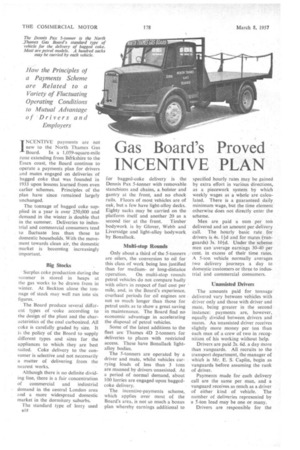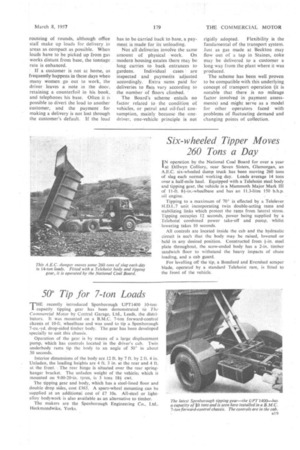Gas Board's Proved INCENTIVE PLAN
Page 52

Page 53

If you've noticed an error in this article please click here to report it so we can fix it.
How the Principles of a Payments Scheme are Related to a Variety of Fluctuating Operating Conditions to Mutual Advantage of' Drivers and Employers
INCENTIVE payments are not new to the North Thames Gas
Board. In a 1,059-square-mile zone extending from Berkshire to the Essex coast, the Board continue to operate a payments plan for drivers and mates engaged on deliveries of bagged coke that was founded in 1933 upon lessons learned from even earlier schemes. Principles of the plan have since remained largely unchanged.
The tonnage of bagged coke supplied in a year is over 250,000 and demand in the winter is double that in the summer. Deliveries to industrial and commercial consumers tend to fluctuate less than those to domestic households. With the movement towards clean air, the domestic market is becoming increasingly important.
Big Stocks
Surplus coke production during the summer is stored in heaps at the gas works to be drawn from in winter. At Beckton alone the tonnage of stock may well run into six figures.
The Board produce several different types of 'coke according to the design of the plant and the characteristics of the coal carbonized. All coke is carefully graded by size. It the policy of the Board to supply different types and sizes for the appliances to which they are best suited. Coke delivery to the consumer is selective and not necessarily a matter of delivering from the nearest works.
Although there is no definite dividing line, there is a fair concentration of commercial and industrial demand in the central London area and a more widespread domestic market in the dormitory suburbs.
The standard type of lorry used for bagged-coke delivery is the Dennis Pax 5-tonner with removable stanchions and chains, a bolster and gantry at the front, and no chock rails. Floors of most vehicles are of oak, but a few have fight-alloy decks. Eighty sacks may be carried on the platform itself and another 20 as a second tier at the front. Timber bodywork is by Glover, Webb and Liversidge and light-alloy bodywork by Bonallack.
Multi-stop Rounds
Only about a third of the 5-tonners are oilers, the conversion to oil for this class of work being less justified than for mediumor long-distance operation. On multi-stop rounds petrol vehicles do not compare badly with oilers in respect of fuel cost per mile, and, in the Board's experience, overhaul periods for oil engines are not so much longer than those for petrol units as to show a great saving in maintenance. The Board find no economic advantage in accelerating the disposal of petrol vehicles.
Some of the latest additions to the fleet are Thames 4D 2-tonners for deliveries to places with restricted access. These have Banallack lightalloy bodies.
The 5-Winters are operated by a driver and mate, whilst vehicles carrying loads of less than 3 tons are manned by drivers unassisted. At a period of normal demand, about 100 lorries are engaged. upon baggedcoke delivery.
The incentive-payments scheme, which applies over most of the Board's area, is not so much a bonus plan whereby earnings additional to specified hourly rates may be gained by extra effort in various directions, as a piecework system by which weekly wages as a whole are calculated. There is a guaranteed daily minimum wage, but the time element otherwise does not directly enter the scheme.
Men are paid a sum per ton delivered and an amount per delivery Call. The hourly basic rate for drivers is 4s. 11-d and for mates (vanguards) 3s. 10fel. Under the scheme men can average earnings 30-40 per cent. in excess of their time rates. A 5-ton vehicle normally averages two delivery journeys a day to domestic customers or three to industrial and commercial consumers.
Unassisted Drivers The amounts paid for tonnage delivered vary between vehicles with driver only and those with driver and mate, being greater in the second instance: payments . are, however, equally divided between. drivers and mates. An unassisted driver receives slightly more money per ton than each roan of a crew of two in recognition of his working without help.
Drivers are paid 2s. 6d. a day more than vanguards. All recruits to the transport department, the manager of which is Mr. E. S. Caplin, begin as vanguards before assuming the rank of driver.
Payments made for each delivery call are the same per man, and a vanguard receives as much as a driver of either kind of vehicle. The number of deliveries represented by a 5-ton load may be one or many.
Drivers are responsible for the routeing of rounds, although office staff make up loads for delivery in areas as compact as possible. When loads have to be picked up from gas works distant from base, the tonnage rate is enhanced.
If a customer is not at home, as frequently-happens in these days when many women go out to work, the driver leaves a note in the door, retaining a counterfoil in his book, and telephones his base. Often it is possible to divert the load to another customer, and the payment for making a delivery is not lost through the customer's default. If the load has to be Carried back to base, a payment is made for its unloading.
Not all deliveries involve the same amount of physical work. On modern housing estates there may be long carries to back entrances to gardens. Individual cases are inspected and payments adjusted accordingly. Extra sums paid for deliveries to flats vary according to the number of floors climbed. '
The Board's scheme entails no factor related to • the condition Of vehicles, or petrol and oil-fuel consumption, mainly because the onedriver, one-vehicle principle is not rigidly adopted. Flexibility is the
fundamental of the transport system. Just as gas made at Beckton may flow out of a tap in Staines, coke may be delivered toa customer a long way from the plant where it was produced.
The scheme has been well proven to be compatible with this underlying concept of transport operation (it is notable that there is no mileage factor involved in payment assessments) and might serve as a model for other operators faced with problems of fluctuating demand and changing points of collection.




































































































